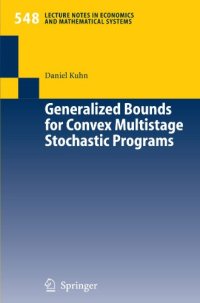
Ebook: Generalized Bounds for Convex Multistage Stochastic Programs
- Genre: Mathematics // Probability
- Tags: Operations Research/Decision Theory, Optimization, Probability Theory and Stochastic Processes, Economic Theory
- Series: Lecture Notes in Economics and Mathematical Systems 548
- Year: 2005
- Publisher: Springer-Verlag Berlin Heidelberg
- City: Berlin; London
- Edition: 1
- Language: English
- djvu
This work was completed during my tenure as a scientific assistant and d- toral student at the Institute for Operations Research at the University of St. Gallen. During that time, I was involved in several industry projects in the field of power management, on the occasion of which I was repeatedly c- fronted with complex decision problems under uncertainty. Although usually hard to solve, I quickly learned to appreciate the benefit of stochastic progr- ming models and developed a strong interest in their theoretical properties. Motivated both by practical questions and theoretical concerns, I became p- ticularly interested in the art of finding tight bounds on the optimal value of a given model. The present work attempts to make a contribution to this important branch of stochastic optimization theory. In particular, it aims at extending some classical bounding methods to broader problem classes of practical relevance. This book was accepted as a doctoral thesis by the University of St. Gallen in June 2004.1 am particularly indebted to Prof. Dr. Karl Frauendorfer for - pervising my work. I am grateful for his kind support in many respects and the generous freedom I received to pursue my own ideas in research. My gratitude also goes to Prof. Dr. Georg Pflug, who agreed to co-chair the dissertation committee. With pleasure I express my appreciation for his encouragement and continuing interest in my work.
This book investigates convex multistage stochastic programs whose objective and constraint functions exhibit a generalized nonconvex dependence on the random parameters. Although the classical Jensen and Edmundson-Madansky type bounds or its extensions are generally not available for such problems, tight bounds can systematically be constructed under mild regularity conditions. A nice primal-dual symmetry property is revealed when the proposed bounding method is applied to linear stochastic programs. After having developed the theoretical concepts, exemplary real-life applications are studied. It is shown how market power, lognormal stochastic processes, and risk-aversion can be properly handled in a stochastic programming framework. Numerical experiments show that the relative gap between the bounds can be reduced to a few percent without exploding the problem size.